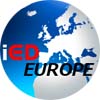Fourth European Immersive Education Summit
 Vienna (AU), February 2014 - The objective of the European Immersive Education (iED) Summit is to bring together researchers, developers, educators, decision makers, and industry representatives from all over the world. It consists of scientific presentations, poster sessions, panel discussions, and break-out sessions. Fairly new is the hands-on demo stream, which combines a short paper presentation with an extended hands-on presentation for the attendees.
Vienna (AU), February 2014 - The objective of the European Immersive Education (iED) Summit is to bring together researchers, developers, educators, decision makers, and industry representatives from all over the world. It consists of scientific presentations, poster sessions, panel discussions, and break-out sessions. Fairly new is the hands-on demo stream, which combines a short paper presentation with an extended hands-on presentation for the attendees.
 Vienna (AU), February 2014 - The objective of the European Immersive Education (iED) Summit is to bring together researchers, developers, educators, decision makers, and industry representatives from all over the world. It consists of scientific presentations, poster sessions, panel discussions, and break-out sessions. Fairly new is the hands-on demo stream, which combines a short paper presentation with an extended hands-on presentation for the attendees.
Vienna (AU), February 2014 - The objective of the European Immersive Education (iED) Summit is to bring together researchers, developers, educators, decision makers, and industry representatives from all over the world. It consists of scientific presentations, poster sessions, panel discussions, and break-out sessions. Fairly new is the hands-on demo stream, which combines a short paper presentation with an extended hands-on presentation for the attendees.
Following a bottom-up approach, special tracks and workshops cover emerging topics and trends suggested and organized by the community and focused groups. Furthermore, speed sessions enable participants to present an aspect of their work or interest in a fun and speedy way. The summit will also offer a platform to explore research collaboration and give international research consortiums room to share their results.
The Summit will be organized by and hosted at the University of Applied Science BFI Vienna in conjunction with Graz University of Technology.
Theme
Continuing the success of the conference series, the Fourth European Immersive Education (E-iED) Summit is focusing on "Science meets Business - from Innovative Research to Successful Services and Products”. It covers broad areas, from emerging trends and technologies, sound research and best practices, to successful products and services. iED Summits feature virtual worlds; learning and motivational games; educational simulations; mixed/augmented reality; and related learning and teaching tools, techniques, technologies, and standards.
For the main conference, topics of interest in the context of immersive environments include, but are not limited to, the following:
- immersive techniques, systems and devices
- behavioral and pedagogical analysis
- games and entertainment
- a glance into the future: innovations, challenges and applications
- art and creativity
Venue
E-iED 2014 will take place 24 - 26 November 2014 in Austria’s capital, Vienna. Located in the center of Europe, the city is well connected by its international airport and long-distance train connections. Vienna is not only well known as a conference city but is also famous for its cultural variety as well as the quality and diversity of the cuisine.
Calls for Short and Long Papers
The submitted papers must not exceed six pages (short paper) or ten pages (full paper). Contributions are welcome on work-in-progress, research results, technical development, and best practices. Research, development, and best practices contributions will be accepted according to their quality and relevance either as full or short papers. Work-in-progress will only be accepted as short papers.
Call for Hands-on Demo Papers
As a newly introduced contribution stream, hands-on demo papers will mainly focus on the live presentation of developed tools or innovative applications. Presenters should bring a working prototype and the required devices for the presentation. A short paper description together with a short video will be published.
Call for Poster Presentations
Research and projects in the idea or early-beginning stage as well as work in progress may be also presented by means of posters. The poster submission should consist of a one-page abstract.
Call for Speed-Sharing Contributions
Speed-sharing contributions consist of a one-page abstract. The sessions themselves are limited to five minutes (no question time) with a maximum of eight PowerPoint slides. These presentations enable participants to present an aspect of their work or interest in a fun and speedy way. This is similar to (or derived from) Pecha Kucha. This presentation form is also suitable for late submissions.
Important Dates
Short and long paper submission: 15 June 2014
Notification of acceptance: 31 August 2014





